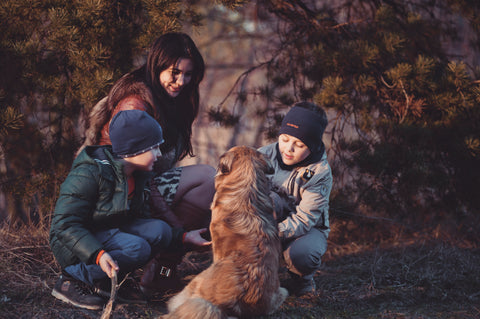Natural Remedies for Dog Anxiety



At ZenCrate, we want to be a resource for owners of pets suffering from anxiety. As we all learn more about how and why anxiety effects pets, we can continue to create products and services to serve these pets, and the families that support them.
While some dogs simply suffer from anxiety for no reason at all, here are the most common causes for anxiety among dogs.
It’s not a myth that cats and dogs can feel a storm coming sooner than a human can. For these reasons, some scientists believe that certain dogs experience extreme anxiety at the onset of a storm. Whether it is the change in barometric pressure, or the loud noises accompanied by a thunderstorm, dogs that experience storm phobia may exhibit behaviors such as hiding under furniture, pacing, trying to escape, or shaking uncontrollably. In these instances, the primary concern is to keep your dog for harming itself, and trying to ensure they are as comfortable as possible until the storm passes.
Lack of Socialization
Socialization at a very young age is key in raising a puppy that isn’t afraid of everything and everyone he or she comes in contact with. Typically, we see anxiety later in life when puppies are taken away from their mothers before 8 weeks old. It’s important to keep this in mind especially when bringing home a new puppy; habits that they pick up early in life can stick with them for a long time to come.
Past Distress
Unfortunately, many shelter dogs have experienced past abuse or trauma, and again these experiences can stay with pets for their entire lives. Signs of past distress may include cowering, self-destructive behavior, or escapism. If you believe that your pet is suffering from anxiety for this reason, the best course of action is to consult your veterinarian to choose an appropriate treatment plan.
Separation anxiety is the most common cause of pet anxiety, and unfortunately one of the hardest to diagnose since it is difficult to tell the difference between a dog who just requires a little extra training, and a dog that is suffering from separation anxiety. Current symptoms of separation anxiety include incessant barking, urinating or defecating in the house, destructive habits like chewing or digging, escaping, or erratic behavior. First rule out that there are no medical issues with your pet by speaking with your veterinarian, and then check out a few tips on helping to reduce anxiety naturally.

While many people love the idea of supporting their local shelter or pet rescue missions, sometimes it can be difficult to know where to start. Here are some easy suggestions on how you can get involved, and make sure that the organization you’re volunteering with is the right fit for you!
Find the shelter that’s right for you.
When you get to know your local shelters, you can make a more educated decision on who (and how) to help. We love theshelterpetproject.org as a resource for this very thing. Not only can you find a pet to adopt, you can also identify thousands of organizations that probably need your help!
Think outside the crate!
While pet rescues are always in need of dog walkers and volunteers to pitch in with cleaning the kennels, they may also be in need of professional services like marketing, plumbing, or construction. If you’ve got a professional service to donate in-kind, you’ll be saving the shelter an additional operating cost that can go to helping pets instead. Use your resources, and get creative!
Get Social.
Help bring awareness to your local shelter or the campaigns of the Humane Society of the United States by sharing their updates on your own Facebook and Social Media Platforms. Use your own audience and help get the word out.
Be an advocate.
Write to your local legislators about changing laws in your county and state. Believe it or not, these letters and emails make a huge difference, especially when they are coming from a concerned (pet loving) citizen!
Get crafty.
Use recycled materials like t-shirts, ropes, and fleece blankets to create DIY toys for dogs and cats in your local shelter. Check out this Pinterest Page for some inspiration!
You’re never too young.
Even kids can help out at their local shelter! We love this article about twin sisters Alexandra and Sydney who give tons of ideas on how to get involved and advocate for animals in need.
If you’ve got a tip about how to pitch in with your local shelter, we’d love to hear from you in the comments below!